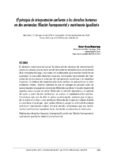The Principle of Conforming Interpretation to Human Rights in Two Sentences: Homo-parental Filiation and Same-sex Marriage
El principio de interpretación conforme a los derechos humanos en dos sentencias: filiación homoparental y matrimonio igualitario
Compartir este ítem
Fecha
2021-05-19Autor
Araya Madariaga, Víctor
Citación
Metadatos
Mostrar el registro completo del ítemDocumentos PDF
Resumen
Current Constitutional Law has developed its interpretation techniques to avoid the hermeneutic tools from the legal interpretation, which are inadequate for solving conflicts related to Human Rights. The principle of conforming interpretation is among these tools. The objective of this article is to verify its application in Chilean jurisprudence. This research hypothesizes that it is not applied every time it is required, which results in different solutions every time it is invoked in comparison to those in which it is not. By employing the dogmatic and the case method through two legal sentences, this study analyzes its practical implementation. The study concludes that one of them applies it properly, while the second one omits it by sentencing something different than what would have been sentenced if the principle was considered, nonetheless, both sentences had to embrace the request of those who requested judicial intervention. Thus, the article states that a constitutional modification might allow a binding application for all cases. El derecho constitucional actual ha desarrollado técnicas de interpretación que le son propias para evitar el uso de herramientas hermenéuticas provenientes de la interpretación legal, las cuales son inadecuadas para resolver conflictos en que están involucrados derechos humanos. Entre estas herramientas de interpretación se encuentra el principio de interpretación conforme a los derechos humanos. El objetivo del presente artículo es verificar su aplicación en la jurisprudencia chilena. Nuestra hipótesis es que no siempre es aplicado cada vez que se requiere, lo que genera soluciones diferentes cuando es invocado respecto de aquellas veces en que se omite. Utilizando el método dogmático y el método de casos a partir de dos sentencias, se analiza su implementación práctica. Concluimos que una de ellas lo aplica correctamente, mientras que la segunda lo omite al arribar a una sentencia diferente de la que se hubiese dictado al considerar el principio. pero ambas debieron acoger la solicitud de quienes solicitaron intervención judicial. En este sentido, sostenemos que una modificación constitucional permitiría hacer vinculante su aplicación en todo caso.


